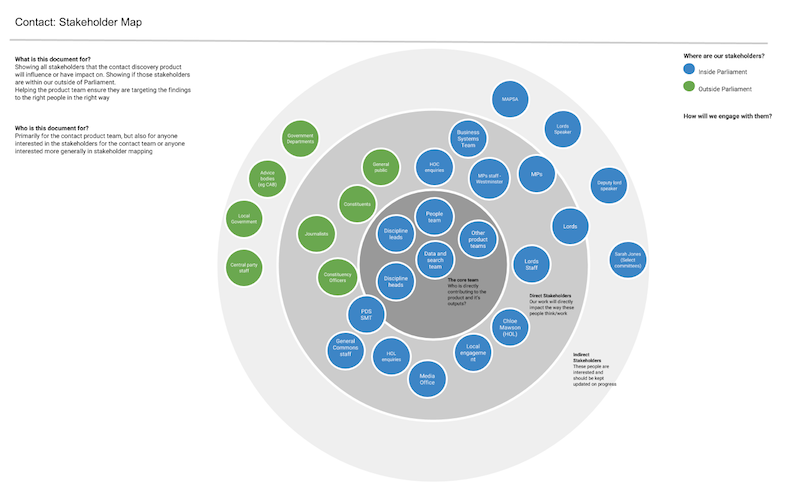sprintnotes.people
Sprint 59 – Desk research and summer breaks
Hello, this is Alan, a content designer working on beta.parliament.uk. At the end of each sprint I will provide an update of the work the members/people team have done and what we learned in the process.
The team’s current focus:
Improve the process of contacting MPs and Lords
Overview
This sprint we’ve seen members of the team make progress on various products, but also enjoy summer breaks and give time to other projects across the Parliamentary Digital Service.
What we’ve done
Desk research for contact
The majority of the team have been involved in desk research as part of our contact discovery work, which we launched last sprint. Areas of investigation have included:
- MPs’ websites
- Members of the House of Lords’ websites
- political party websites
- government websites
- ‘helping organisations’ (i.e. Citizen’s Advice Bureau)
Lords’ websites
I chose to research Members of the House of Lords’ websites and it was enlightening to examine what exists out there. A significant number of peers don’t have websites at all, and there isn’t a standard offering for those that do.
Areas of focus include:
- business ventures
- personal achievements
- speaking engagements
- work in Parliament
The purpose of the research was on how they facilitate users contacting them. Again, there was a lot of variation, but the majority seem to prefer using forms on their websites.
The research hasn’t been sifted through or analysed, but I am intrigued to know what the rest of the team discovered and what we can do with what we find.
Existing contact research
Marttiina is in the process of reviewing and synthesising existing research as part of our contact discovery work. There are folders and folders for her to make her way through it, but she is valiantly chipping away at every available opportunity.
The hope is at the end of the review we will have a greater understanding of how contact has been investigated by the organisation prior to the launch of our discovery.
Contact journeys
Dia met up with Fiona Green, Public Enquiries Manager in Parliament’s Participation team. They discussed the reasons users contact the House of Commons enquiries team and how those enquiries are dealt with. The eventual aim is to create a process map to inform our team’s work during discovery.
Stakeholder mapping
Simon led on our stakeholder mapping activities. We want to understand who our stakeholders are, and how they relate to our work, so we can effectively engage with them.
During the initial session the team created a stakeholder map, which we will look to develop and refine as we make our way through discovery.
The next step is to agree on how we can best liaise and communicate our work with the identified stakeholders.

Find your MP
Naz was looking at failed postcode searches on our ‘Find your MP’ postcode lookup tool. We hypothesised that users may be entering their MP’s name rather than their postcode (which would throw up an error).
Once we have the findings we will discuss them as a group to decide what we can do to reduce the number of failed postcode searches, or if we can implement a solution based on the information we have.
Roles
Dia and Naz reviewed the feedback from a survey we put on the roles pages. Sixty-five per cent of users who completed the survey said they found the information they expected.
Users who responded that they didn’t find what they wanted, and left feedback, said they would like more information on committees and links to other departments. This was informative feedback that supports some of the ideas we have about improving the pages.
Written questions
Joshua tackled a bug with written questions. One of the list pages was displaying content in an unexpected order. The solution to put all top-level lists where possible in reverse-chronological order, and encapsulated lists in chronological order, is now being considered for roll-out across the beta website.
Wider team work
Victor has been sharing his time between our team and the Parliament team. They are currently working on a product that will allow committees to receive evidence submissions via the beta website. Victor has worked with the team to create their second prototype for the next round of user testing, which will take place next week.
Joshua presented several methods for making it visually obvious to a user that tables are scrollable without the use of JavaScript. The next step is to mock-up prototypes for internal review and testing.
What we have planned
Next sprint’s planning session was delayed. The work for next sprint has yet to be agreed, but the team have already discussed:
- completing the review of existing contact research
- creating a plan for engaging with stakeholders
- working with the Enquiries team to create a process map
Other teams
If you’re interested in the work of other teams, you can read sprint notes from:
You can also follow regular updates from the people team’s former product manager, Colin Pattinson, in his current role as product manager at the Department of Health and Social Care.